Despite attempts by the police to retake the legislative chamber yesterday, hundreds of demonstrators — mainly student activists — continued the occupation they began late on Tuesday night to protest the cross-strait trade pact, while thousands more outside the Legislative Yuan kept the building under siege.
“Reject the service trade pact! Reopen the negotiations! Defend our democracy!” about 2,500 protesters — within and outside the legislative chamber — chanted during the day.
The occupation began about 9pm on Tuesday, when more than 200 protesters at a rally being held outside the legislature against the trade pact suddenly climbed over the fences and entered the legislative complex.
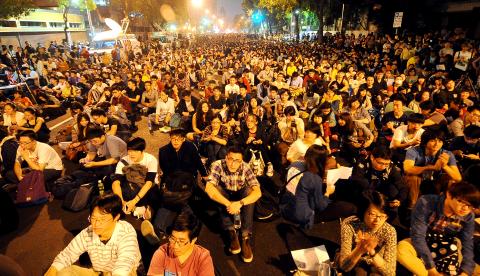
Photo: Taipei Times
They quickly took over the legislative chamber on the ground floor, as well as the second floor of the building, blocking entrances with piles of chairs in an effort to keep out the police.
Hundreds more people arrived outside the Legislative Yuan from about 3:40am in a show of support for the initial protesters. Chanting slogans, the latecomers pushed down a metal gate to enter the complex, but were stopped by police from going into the legislative chamber.
Some had brought ladders to climb into the building through second-floor windows, while others rallied in the parking lot outside the building.
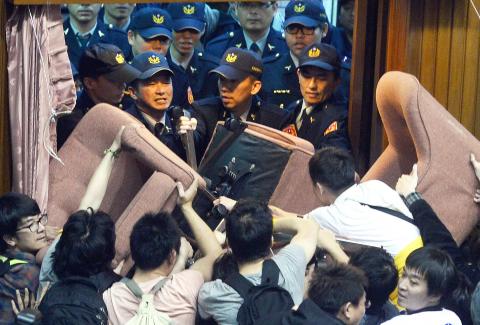
Photo: Wang Yi-sung, Taipei Times
The police made several attempts to break into the legislative chamber, but in vain, as the protesters inside resisted strongly, while those outside the chamber pulled officers away.
During one of the confrontations, police officer Chung Chen-chiang (鍾振強), who suffers from asthma, fainted and was rushed to National Taiwan University Hospital.
More people joined in support of the protesters yesterday morning, with many traveling from central and southern Taiwan, raising the number of demonstrators to more than 2,000, according to official estimates.
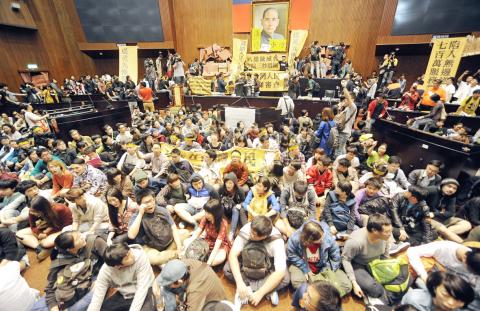
Photo: Liu Hsin-de, Taipei Times
“We estimate that there are more than 2,200 protesters inside and outside of the Legislative Yuan, and we have deployed about 2,000 officers on the scene,” National Police Agency Director-General Wang Cho-chiun (王卓鈞) said as he paid a visit to Chung at the hospital. “So far, 38 officers have been injured and we have arrested four student protesters.”
Lin Fei-fan (林飛帆), a National Taiwan University student and one of the protest leaders, thanked the public for their support.
“Since our plan is to stay here [in the legislative chamber] until Friday, the first thing we did after getting here was to secure a supply channel,” Lin said.
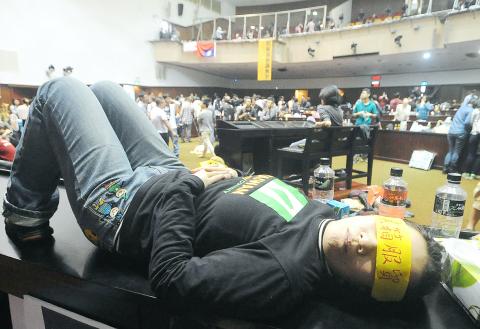
Photo: Liao Chen-huei, Taipei Times
“We are thankful that a lot of supplies — food, water and other necessities — are flowing in non-stop. This shows that the public is upset with the government and that we have the support of the people,” Lin said.
Activists also hung national flags upside down outside the building to express their dissatisfaction with the government’s handling of the trade agreement.
Many people showed their support for the protesters by ordering boxes of snacks online to be delivered to the legislative chamber. One unidentified person ordered NT$10,000 worth of bread to be delivered.
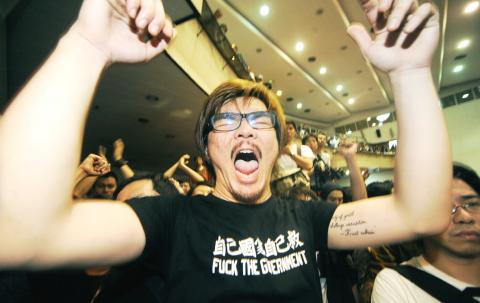
Photo: Liu Hsin-de, Taipei Times
A number of celebrities, including singer-songwriters Chen Ming-chang (陳明章) and Deserts Chang (張懸), actor Huang Ho (黃河) and entertainer Cheng Chia-chen (鄭佳甄) — who is better known by her nickname “Chicken Cutlet Girl” (雞排妹) — showed up during the day to voice their support for the protest.
The crowd was excited and sang along when Chen led them to sing his hit song Wandering to Tamsui (流浪到淡水).
A number of foreign residents also joined in, including Vietnamese immigrant Lu Viet Hung.
“I am here to protest that the government is trying to pass the pact without the consent of the Taiwanese,” Lu said. “I would like to call on everyone to urge more friends to come out, as this may be a crisis for Taiwan’s democracy.”
While the protest remained mostly peaceful, one girl cut her wrist and used her blood to draw a heart on the wall in the legislature.
She did not give her name to reporters or explain what she was trying to say, and was quickly taken away to the health center.
At the beginning of the occupation, the police tried to force the activists out of the legislative chamber by closing the toilets and turning off the air-conditioning system, but the toilets were reopened early in the morning, and the air-conditioning was turned back on shortly after 10am, after protesters outside the chamber threatened to break in if Legislative Yuan officials did not restore the air-conditioning.
The occupation of the legislative chamber and the siege outside were continuing as of press time.

AIR SUPPORT: The Ministry of National Defense thanked the US for the delivery, adding that it was an indicator of the White House’s commitment to the Taiwan Relations Act Deputy Minister of National Defense Po Horng-huei (柏鴻輝) and Representative to the US Alexander Yui on Friday attended a delivery ceremony for the first of Taiwan’s long-awaited 66 F-16C/D Block 70 jets at a Lockheed Martin Corp factory in Greenville, South Carolina. “We are so proud to be the global home of the F-16 and to support Taiwan’s air defense capabilities,” US Representative William Timmons wrote on X, alongside a photograph of Taiwanese and US officials at the event. The F-16C/D Block 70 jets Taiwan ordered have the same capabilities as aircraft that had been upgraded to F-16Vs. The batch of Lockheed Martin

GRIDLOCK: The National Fire Agency’s Special Search and Rescue team is on standby to travel to the countries to help out with the rescue effort A powerful earthquake rocked Myanmar and neighboring Thailand yesterday, killing at least three people in Bangkok and burying dozens when a high-rise building under construction collapsed. Footage shared on social media from Myanmar’s second-largest city showed widespread destruction, raising fears that many were trapped under the rubble or killed. The magnitude 7.7 earthquake, with an epicenter near Mandalay in Myanmar, struck at midday and was followed by a strong magnitude 6.4 aftershock. The extent of death, injury and destruction — especially in Myanmar, which is embroiled in a civil war and where information is tightly controlled at the best of times —

China's military today said it began joint army, navy and rocket force exercises around Taiwan to "serve as a stern warning and powerful deterrent against Taiwanese independence," calling President William Lai (賴清德) a "parasite." The exercises come after Lai called Beijing a "foreign hostile force" last month. More than 10 Chinese military ships approached close to Taiwan's 24 nautical mile (44.4km) contiguous zone this morning and Taiwan sent its own warships to respond, two senior Taiwanese officials said. Taiwan has not yet detected any live fire by the Chinese military so far, one of the officials said. The drills took place after US Secretary

THUGGISH BEHAVIOR: Encouraging people to report independence supporters is another intimidation tactic that threatens cross-strait peace, the state department said China setting up an online system for reporting “Taiwanese independence” advocates is an “irresponsible and reprehensible” act, a US government spokesperson said on Friday. “China’s call for private individuals to report on alleged ‘persecution or suppression’ by supposed ‘Taiwan independence henchmen and accomplices’ is irresponsible and reprehensible,” an unnamed US Department of State spokesperson told the Central News Agency in an e-mail. The move is part of Beijing’s “intimidation campaign” against Taiwan and its supporters, and is “threatening free speech around the world, destabilizing the Indo-Pacific region, and deliberately eroding the cross-strait status quo,” the spokesperson said. The Chinese Communist Party’s “threats